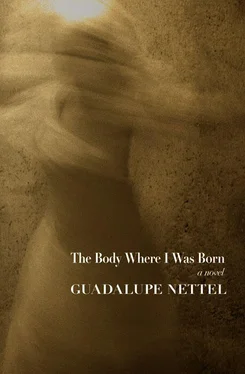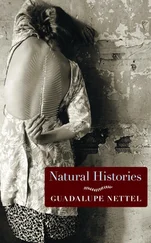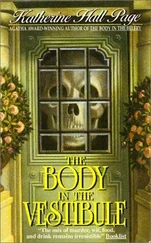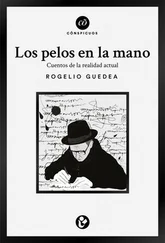A few weeks later, for the first time in two years, I received a long letter from my father. I would have loved to have kept it, to be able to reproduce a few of its lines. It was obvious that this letter, which didn’t explain anything or dispel our possible concerns, was written in a moment of great despair and catharsis. He told us that it was cold and the dampness in his cell was unbearable. He also told us that he hadn’t been able to move his foot for over a week, one of his toes had turned purple then black from a blood clot, and he had gone to the doctor who had given him some medicine but he had yet to feel its effect. He also told us that we, his children, were the best things in his life. Every morning he remembered us all together and those loving memories helped keep him alive, without losing hope. By the time the card arrived, a month and a half after the postmarked date, he had probably gotten better, either from the medicine or from a surgical amputation of the black toe, and still the card was like a cry for help suspended in time and reached our ears as such. Had I been older and had my own money, there is no doubt I would have hopped on the first flight to Mexico to go see him, but at that age and in my circumstances the only thing I could do was respond to the letter and wait another month and a half for it to reach him. Thus I began a drawn-out correspondence with my father, beneficial to us both, and the physical evidence of which is lost now somewhere in the ocean, but not forgotten.
The second time Mexico burst onto center stage was less dismal, true, but also very intense. It happened the following year during the 1986 World Cup, which my brother and Sunil followed unblinkingly on the same television where months earlier we had seen images of our destroyed city. Even though we were living far away, everything seemed to revolve around this country that had been laid to waste. I perfectly remember Pique, the World Cup mascot, because my brother and I shared the nickname during the last few months of our classes, and also Mar Castro, the “Chiquitibum,” whom all the boys brought up in the cafeteria, asking me if I knew her personally. I also remember the final and the controversial goal by Maradona, whom we were rooting for at home because Mexico had lost and Sunil couldn’t stand the German team. Contrary to what could be expected from me, I didn’t follow the World Cup with the passionate abandon that one year before I undoubtedly would have shown. So much had happened recently that there wasn’t any room left in my spirit for strong emotions.
We spent our first vacation in Mexico at my grandmother’s big ramshackle house. Several changes had taken place. Beyond the rubble left by the earthquake, visible everywhere, there had been collapses on the familial scale too. We found one of these small yet eloquent changes on arriving from the airport. On the way, our grandmother kept telling us that a surprise awaited us on the roof of her house. As soon as she parked the car my brother and I climbed to the third floor to see what it was. There we found Betty, who two years ago had disappeared on the streets of Amatlán. When she saw us, she started barking with joy and lovingly jumping on us. Our grandmother said it was the first time in months she had looked so happy. And later, in a tone mysterious and amused, she said to me, “They say dogs look like their masters and she turned out identical to you.”
We stayed there almost the entire summer vacation, from the end of June until late August. My mother returned to France almost immediately to start writing her thesis. Despite how difficult living together had been a few years earlier, staying at our grandmother’s house wasn’t as awful for me as one might think. This time, we were both relaxed, knowing it was only for a relatively short time. And in a few weeks my cousins would come to visit for fifteen days and the house would be happy, full of kids of all ages. Like always when our relatives came, my grandmother moved her belongings from room to room to accommodate them. Purses and shoes from the forties circulated once again through the hallways and foyer in a trajectory impossible to interpret much less predict. However, this time the wave contained a new and troubling element: among the newspaper clippings, and the hats and clothing that poked out of all those boxes, I recognized my own toys. Apparently, everything we had decided not to bring to France with us had been sucked into the maelstrom. My childhood now formed a part of that shifting past, and yet was still present in the house like a sand pit ready to swallow everything if you take your eyes off it. But the most memorable event that took place during the trip was our longed-for reunion with my father. Now that his whereabouts had been revealed, we could visit him at last.
Dad was locked up in a preventative detention facility known as Reclusorio Preventivo Norte, or RENO, a prison for those who were not yet formally charged. While awaiting his sentencing, he had the privilege of wearing beige, a vague and indistinct color halfway between excretory brown and innocent white. In the prison for the condemned, we later learned, inmates wore navy blue, a color that didn’t allow for ambiguity. My grandmother, who had already been to see him, was our Virgil into that institution, a place not exactly a hell, but more a purgatory and also a kind of casino where luck could favor you in a flash or leave you in the worst kind of ruin. Many influential prisoners, the Mafia and drug traffickers, lived there in that decade, in cells befitting their eccentric and luxurious standards of living. My grandmother decided to take us there, but not by the sterile car nor taxi cabs she often rode. She chose, and I think she was right, to carry us by the route most visitors took to get there — public transportation — which back then was old, dirty, and unreliable. So we embarked on an arduous procession across the entire city on the roads that for Luis Buñuel evoked France’s cour des miracles , districts where people lived in flimsy constructions of tin laminate or cardboard and warmed their hands over hotplates. Near the prison, you could see a display of foods, watches, bags, stuffed animals, underwear, videocassettes, and decorations for the home, similar to the kind often found around some metro stations. Our ride turned out to be effectively transitional and also desensitizing. Because of it, when we reached the prison gates we weren’t terrified, and we weren’t unnerved.
The prison was gray and fairly rectangular or square in shape, a comb-like structure as it’s often called in architecture. There had originally been ten dormitories laid out side by side, in addition to the admissions dormitory and another for observation and classification, through which every new inmate inevitably had to pass before being assigned a permanent dormitory. To get inside, we had to stand in different lines and wait our turn. At the start of each of these waits, we were asked to write our names on a list and to write the name of our imprisoned family member under a column marked “Offender,” in a strange ritual of initiation or affiliation. They also asked the nature of the relationship, and so we wrote, five or so times, the word “father” on lists with names of our capital’s alleged criminals. In that moment, it felt to me as if there had been a monumental mistake, an arbitrary injustice dealt by the hand of fate that we had to face as I had the divorce, Ximena’s death, and my mother’s going to France. I don’t know what your thoughts are, Dr. Sazlavski, but, for me, the supposed wonder of childhood that people talk about is one of those dirty tricks that memory plays on us. As different as one life is from another, I am sure that no childhood is entirely pleasant. Children live in a world of circumstances decided for them. Others decide — the people they are with, the place they live, the school they attend, and even the food they eat every day. My father being a prisoner was just more of the same. No use crying or arguing.
Читать дальше












